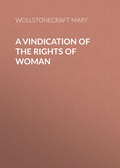
Wollstonecraft Mary
Mary Wollstonecraft's Original Stories
CHAPTER XIII
Employment. – Idleness produces Misery. – The Cultivation of the Fancy raises us above the Vulgar, extends our Happiness, and leads to Virtue.
One afternoon, Mrs. Mason gave the children leave to amuse themselves; but a kind of listlessness hung over them, and at a loss what to do, they seemed fatigued with doing nothing. They eat cakes though they had just dined, and did many foolish things merely because they were idle. Their friend seeing that they were irresolute, and could not fix on any employment, requested Caroline to assist her to make some clothes, that a poor woman was in want of, and while we are at work, she added, Mary will read us an entertaining tale, which I will point out.
The tale interested the children, who chearfully attended, and after it was finished, Mrs. Mason told them, that as she had some letters to write, she could not take her accustomed walk; but that she would allow them to represent her, and act for once like women. They received their commission, it was to take the clothes to the poor woman, whom they were intended for; learn her present wants; exercise their own judgment with respect to the immediate relief she stood in need of, and act accordingly.
They returned home delighted, eager to tell what they had done, and how thankful, and happy they had left the poor woman.
Observe now, said Mrs. Mason, the advantages arising from employment; three hours ago, you were uncomfortable, without being sensible of the cause, and knew not what to do with yourselves. Nay, you actually committed a sin; for you devoured cakes without feeling hunger, merely to kill time, whilst many poor people have not the means of satisfying their natural wants. When I desired you to read to me you were amused; and now you have been useful you are delighted. Recollect this in future when you are at a loss what to do with yourselves – and remember that idleness must always be intolerable, because it is only an irksome consciousness of existence.
Every gift of Heaven is lent to us for our improvement; fancy is one of the first of the inferiour ones; in cultivating it, we acquire what is called taste, or a relish for particular employments, which occupy our leisure hours, and raise us above the vulgar in our conversation. Those who have not any taste talk always of their own affairs or of their neighbours; every trivial matter that occurs within their knowledge they convass and conjecture about – not so much out of ill-nature as idleness: just as you eat the cakes without the impulse of hunger. In the same style people talk of eating and dress, and long for their meals merely to divide the day, because the intermediate time is not employed in a more interesting manner. Every new branch of taste that we cultivate, affords us a refuge from idleness, a fortress in which we may resist the assaults of vice; and the more noble our employments, the more exalted will our minds become.
Music, drawing, works of usefulness and fancy, all amuse and refine the mind, sharpen the ingenuity; and form, insensibly, the dawning judgment. – As the judgment gains strength, so do the passions also; we have actions to weigh, and need that taste in conduct, that delicate sense of propriety, which gives grace to virtue. The highest branch of solitary amusement is reading; but even in the choice of books the fancy is first employed; for in reading, the heart is touched, till its feelings are examined by the understanding, and the ripenings of reason regulate the imagination. This is the work of years, and the most important of all employments. When life advances, if the heart has been capable of receiving early impressions, and the head of reasoning and retaining the conclusions which were drawn from them; we have acquired a stock of knowledge, a gold mine which we can occasionally recur to, independent of outward circumstances.
The supreme Being has every thing in Himself; we proceed from Him, and our knowledge and affections must return to Him for employment suited to them. And those who most resemble Him ought, next to Him, to be the objects of our love; and the beings whom we should try to associate with, that we may receive an inferiour degree of satisfaction from their society. – But be assured our chief comfort must ever arise from the mind’s reviewing its own operations – and the whispers of an approving conscience, to convince us that life has not slipped away unemployed.
CHAPTER XIV
Innocent Amusements. – Description of a Welsh Castle. – History of a Welsh Harper. – A tyrannical Landlord. – Family Pride.
As it was now harvest time, the new scene, and the fine weather delighted the children, who ran continually out to view the reapers. Indeed every thing seemed to wear a face of festivity, and the ripe corn bent under its own weight, or, more erect, shewed the laughing appearance of plenty.
Mrs. Mason always allowing the gleaners to have a sufficient quantity, a great number of poor came to gather a little harvest; and she was pleased to see the feeble hands of childhood and age, collecting the scattered ears.
Honest Jack came with his family; and when the labours of the day were over, would play on a fiddle, that frequently had but three strings. But it served to set the feet in motion, and the lads and lasses dancing on the green sod, suffered every care to sleep.
An old Welsh harper generally came to the house about this time of the year, and staid a month or more; for Mrs. Mason was particularly fond of this instrument, and interested in the fate of the player; as is almost always the case, when we have rescued a person out of any distress.
She informed the children, that once travelling through Wales, her carriage was overturned near the ruins of an old castle. And as she had escaped unhurt, she determined to wander amongst them, whilst the driver took care of his horses, and her servant hastened to the neighbouring village for assistance.
It was almost dark, and the lights began to twinkle in the scattered cottages. The scene pleased me, continued Mrs. Mason, I thought of the various customs which the lapse of time unfolds; and dwelt on the state of the Welsh, when this castle, now so desolate, was the hospitable abode of the chief of a noble family. These reflections entirely engrossed my mind, when the sound of a harp reached my ears. Never was any thing more opportune, the national music seemed to give reality to the pictures which my imagination had been drawing. I listened awhile, and then trying to trace the pleasing sound, discovered, after a short search, a little hut, rudely built. The walls of an old tower supported part of the thatch, which scarcely kept out the rain, and the two other sides were stones cemented, or rather plaistered together, by mud and clay.
I entered, and beheld an old man, sitting by a few loose sticks, which blazed on the hearth; and a young woman, with one child at her breast, sucking, and another on her knee: near them stood a cow and her calf. The man had been playing on the harp, he rose when he saw me, and offered his chair, the only one in the room, and sat down on a large chest in the chimney-corner. When the door was shut, all the light that was admitted came through the hole, called a chimney, and did not much enliven the dwelling. I mentioned my accident to account for my intrusion, and requested the harper again to touch the instrument that had attracted me. A partition of twigs and dried leaves divided this apartment from another, in which I perceived a light; I enquired about it, and the woman, in an artless manner, informed me, that she had let it to a young gentlewoman lately married, who was related to a very good family, and would not lodge any where, or with any body. This intelligence made me smile, to think that family pride should be a solace in such extreme poverty.
I sat there some time, and then the harper accompanied me to see whether the carriage was repaired; I found it waiting for me; and as the inn I was to sleep at was only about two miles further, the harper offered to come and play to me whilst I was eating my supper. This was just what I wished for, his appearance had roused my compassion as well as my curiosity, and I took him and his harp in the chaise. After supper he informed me, that he had once a very good farm; but he had been so unfortunate as to displease the justice, who never forgave him, nor rested till he had ruined him. This tyrant always expected his tenants to assist him to bring in his harvest before they had got in their own. The poor harper was once in the midst of his, when an order was sent to him to bring his carts and servants, the next day, to the fields of this petty king. He foolishly refused; and this refusal was the foundation of that settled hatred which produced such fatal consequences. Ah, Madam, said the sufferer, your heart would ache, if you heard of all his cruelties to me, and the rest of his poor tenants. He employs many labourers, and will not give them as much wages as they could get from the common farmers, yet they dare not go any-where else to work when he sends for them. The fish that they catch they must bring first to him, or they would not be allowed to walk over his grounds to catch them; and he will give just what he pleases for the most valuable part of their pannier.
But there would be no end to my story were I to tell you of all his oppressions. I was obliged to leave my farm; and my daughter, whom you saw this evening, having married an industrious young man, I came to live with them. When, – would you believe it? this same man threw my son into jail, on account of his killing a hare, which all the country folks do when they can catch them in their grounds. We were again in great distress, and my daughter and I built the hut you saw in the waste, that the poor babes might have a shelter. I maintain them by playing on the harp, – the master of this inn allows me to play to the gentry who travel this way; so that I pick up a few pence, just enough to keep life and soul together, and to enable me to send a little bread to my poor son John Thomas.
He then began one of the most dismal of his Welsh ditties, and, in the midst of it cried out, he is an upstart, a mere mushroom! – His grandfather was cow-boy to mine! – So I told him once, and he never forgot it. —
The old man then informed me that the castle in which he now was sheltered formerly belonged to his family – such are the changes and chances of this mortal life – said he, and hastily struck up a lively tune. —
While he was striking the strings, I thought too of the changes in life which an age had produced. The descendant of those who had made the hall ring with social mirth now mourned in its ruins, and hung his harp on the mouldering battlements. Such is the fate of buildings and of families!
After I had dismissed my guest, I sent for the landlord, to make some further enquiries; and found that I had not been deceived; I then determined to assist him, and thought my accident providential. I knew a man of consequence in the neighbourhood, I visited him, and exerted myself to procure the enlargement of the young man. I succeeded; and not only restored him to his family; but prevailed on my friend to let him rent a small farm on his estate, and I gave him money to buy stock for it, and the implements of husbandry.
The old harper’s gratitude was unbounded; the summer after he walked to visit me; and ever since he has contrived to come every year to enliven our harvest-home. – This evening it is to be celebrated.
The evening came; the joyous party footed it away merrily, and the sound of their shoes was heard on the barn-floor. It was not the light fantastic toe, that fashion taught to move, but honest heart-felt mirth, and the loud laugh, if it spoke the vacant head, said audibly that the heart was guileless.
Mrs. Mason always gave them some trifling presents at this time, to render the approach of winter more comfortable. To the men, she generally presented warm clothing, and to the women flax and worsted for knitting and spinning; and those who were the most industrious received a reward when the new year commenced. The children had books given to them, and little ornaments. – All were anxious for the day; and received their old acquaintance, the harper, with the most cordial smiles.
CHAPTER XV
Prayer. – A Moon-light Scene. – Resignation.
The harper would frequently sit under a large elm, a few paces from the house, and play some of the most plaintive Welsh tunes. While the people were eating their supper, Mrs. Mason desired him to play her some favourite airs; and she and the children walked round the tree under which he sat, on the stump of another.
The moon rose in cloudless majesty, and a number of stars twinkled near her. The softened landscape inspired tranquillity, while the strain of rustic melody gave a pleasing melancholy to the whole – and made the tear start, whose source could scarcely be traced. The pleasure the sight of harmless mirth gave rise to in Mrs. Mason’s bosom, roused every tender feeling – set in motion her spirits. – She laughed with the poor whom she had made happy, and wept when she recollected her own sorrows; the illusions of youth – the gay expectations that had formerly clipped the wings of time. – She turned to the girls – I have been very unfortunate, my young friends; but my griefs are now of a placid kind. Heavy misfortunes have obscured the sun I gazed at when first I entered life – early attachments have been broken – the death of friends I loved has so clouded my days; that neither the beams of prosperity, nor even those of benevolence, can dissipate the gloom; but I am not lost in a thick fog. – My state of mind rather resembles the scene before you, it is quiet – I am weaned from the world, but not disgusted – for I can still do good – and in futurity a sun will rise to cheer my heart. – Beyond the night of death, I hail the dawn of an eternal day! I mention my state of mind to you, that I may tell you what supports me.
The festivity within, and the placidity without, led my thoughts naturally to the source from whence my comfort springs – to the Great Bestower of every blessing. Prayer, my children, is the dearest privilege of man, and the support of a feeling heart. Mine has too often been wounded by ingratitude; my fellow-creatures, whom I have fondly loved, have neglected me – I have heard their last sigh, and thrown my eyes round an empty world; but then more particularly feeling the presence of my Creator, I poured out my soul before Him – and was no longer alone! – I now daily contemplate His wonderful goodness; and, though at an awful distance, try to imitate Him. This view of things is a spur to activity, and a consolation in disappointment.
There is in fact a constant intercourse kept up with the Creator, when we learn to consider Him, as the fountain of truth, which our understanding naturally thirsts after. But His goodness brings Him still more on a level with our bounded capacities – for we trace it in every work of mercy, and feel, in sorrow particularly, His fatherly care. Every blessing is doubled when we suppose it comes from Him, and afflictions almost lose their name when we believe they are sent to correct, not crush us. – Whilst we are alive to gratitude and admiration, we must adore God.
The human soul is so framed, that goodness and truth must fill it with ineffable pleasure, and the nearer it approaches to perfection, the more earnestly will it pursue those virtues, discerning more clearly their beauty.
The Supreme Being dwells in the universe. He is as essentially present to the wicked as to the good; but the latter delight in His presence, and try to please Him, whilst the former shrink from a Judge, who is of too pure a nature to behold iniquity. – The wicked wish for the rocks to cover them, mountains, or the angry sea, which we the other day surveyed, to hide them from the presence of that Being – in whose presence only they could find joy. You feel emotions that incite you to do good; and painful ones disturb you, when you have resisted the faithful internal monitor. The wiser, and the better you grow, the more visible, if I may use the expression, will God become – For wisdom consists in searching Him out – and goodness in endeavouring to copy His attributes.
To attain any thing great, a model must be held up to exercise our understanding, and engage our affections. A view of the disinterested goodness of God is therefore calculated to touch us more than can be conceived by a depraved mind. When the love of God is shed abroad in our hearts; true courage will animate our conduct, for nothing can hurt those who trust in Him. If the desire of acting right is ever present with us, if admiration of goodness fills our souls; we may be said to pray constantly. And if we try to do justice to all our fellow-creatures, and even to the brute creation; and assist them as far as we can, we prove whose servants we are, and whose laws we transcribe in our lives.
Never be very anxious, when you pray, what words to use; regulate your thoughts; and recollect that virtue calms the passions, gives clearness to the understanding, and opens it to pleasures that the thoughtless and vicious have not a glimpse of. You must, believe me, be acquainted with God to find peace, to rise superior to worldly temptations. Habitual devotion is of the utmost consequence to our happiness, as what oftenest occupies the thoughts will influence our actions. But, observe what I say, —that devotion is mockery and selfishness, which does not improve our moral character.
Men, of old, prayed to the devil, sacrificed their children to him; and committed every kind of barbarity and impurity. But we who serve a long-suffering God should pity the weakness of our fellow-creatures; we must not beg for mercy and not shew it; – we must not acknowledge that we have offended, without trying to avoid doing so in future. We are to deal with our fellow-creatures as we expect to be dealt with. This is practical prayer! – Those who practise it feel frequently sublime pleasures, and lively hopes animate them in this vale of tears; that seem a foretaste of the felicity they will enjoy, when the understanding is more enlightened, and the affections properly regulated.
To-morrow I will take you to visit the school-mistress of the village, and relate her story, to enforce what I have been saying.
Now you may go and dance one or two dances; and I will join you after I have taken a walk, which I wish to enjoy alone.
CHAPTER XVI
The Benefits arising from Devotion. – The History of the Village School-mistress. – Fatal Effects of Inattention to Expences, in the History of Mr. Lofty.
The next morning Mrs. Mason desired the children to get their work, and draw near the table whilst she related the promised history; and in the afternoon, if the weather be fine, they were to visit the village school-mistress.
Her father, the honourable Mr. Lofty, was the youngest son of a noble family; his education had been liberal, though his fortune was small. His relations, however, seemed determined to push him forward in life, before he disobliged them by marrying the daughter of a country clergyman, an accomplished, sensible woman.
Some time after the birth of his daughter Anna, his elder brother, the Earl of Caermarthen, was reconciled to him; but this reconciliation only led him into expences, which his limited fortune could not bear. Mr. Lofty had a high sense of honour, and rather a profuse turn; he was, beside, a very humane man, and gave away much more than he could afford to give, when his compassion was excited. He never did a mean action; but sometimes an ostentatious pride tarnished the lustre of very splendid ones, made them appear to judicious eyes, more like tinsel, than gold. I will account for it. His first impulse arose from sensibility, and the second from an immoderate desire of human applause: for he seemed not to be alive to devotional feelings, or to have that rock to rest on, which will support a frail being, and give true dignity to a character, though all nature combined to crush it.
Mrs. Lofty was not a shining character – but I will read you a part of a letter, which her daughter, the lady we are to visit, wrote to me.
‘This being the anniversary of the day on which an ever loved, and much revered parent was released from the bondage of mortality, I observe it with particular seriousness, and with gratitude; for her sorrows were great, her trials severe – but her conduct was blameless: yet the world admired her not; her silent, modest virtues, were not formed to attract the notice of the injudicious crowd, and her understanding was not brilliant enough to excite admiration. But she was regardless of the opinion of the world; she sought her reward in the source from whence her virtue was derived – and she found it. – He, who, for wise and merciful purposes, suffered her to be afflicted, supported her under her trials; thereby calling forth the exercise of those virtues with which He had adorned her gentle soul; and imparting to her a degree of heart-felt comfort, which no earthly blessing could afford.’
This amiable parent died when Anna was near eighteen, and left her to the care of her father, whose high spirit she had imbibed. However, the religious principles which her mother had instilled regulated her notions of honour, and so elevated her character, that her heart was regulated by her understanding.
Her father who had insensibly involved himself in debt, after her mother’s death, tried many different schemes of life, all of which, at first wore a promising aspect; but wanting that suppleness of temper, that enables people to rise in the world, his struggles, instead of extricating, sunk him still deeper. Wanting also the support of religion, he became sour, easily irritated, and almost hated a world whose applause he had once eagerly courted. His affairs were at last in such a desperate state, that he was obliged, reluctantly, to accept of an invitation from his brother, who with his wife, a weak fine lady, intended to spend some time on the continent; his daughter was, of course, to be of the party.
The restraint of obligations did not suit his temper, and feeling himself dependent, he imagined every one meant to insult him.
Some sarcasms were thrown out one day by a gentleman, in a large company; they were not personal, yet he took fire. His sore mind was easily hurt, he resented them; and heated by wine, they both said more than their cool reason would have suggested. Mr. Lofty imagined his honour was wounded, and the next morning sent him a challenge – They met – and he killed his antagonist, who, dying, pardoned him, and declared that the sentiments which had given him so much offence, fell from him by accident, and were not levelled at any person.
The dying man lamented, that the thread of a thoughtless life had been so suddenly snapped – the name of his wife and children he could not articulate, when something like a prayer for them escaped his livid lips, and shook his exhausted frame – The blood flowed in a copious stream – vainly did Mr. Lofty endeavour to staunch it – the heart lost its vital nourishment – and the soul escaped as he pressed the hand of his destroyer. – Who, when he found him breathless, ran home, and rushed in a hurry into his own chamber. The dead man’s image haunted his imagination – he started – imagined that he was at his elbow – and shook the hand that had received the dying grasp – yet still it was pressed, and the pressure entered into his very soul – On the table lay two pistols, he caught up one, – and shot himself. – The report alarmed the family – the servants and his daughter, for his brother was not at home, broke open the door, – and she saw the dreadful sight! As there was still some appearance of life, a trembling ray – she supported the body, and sent for assistance. But he soon died in her arms without speaking, before the servant returned with a surgeon.
Horror seized her, another pistol lay charged on the table, she caught it up, but religion held her hand – she knelt down by a dead father, and prayed to a superior one. Her mind grew calmer – yet still she passionately wished she had but heard him speak, or that she had conveyed comfort to his departing spirit – where, where would it find comfort? again she was obliged to have recourse to prayer.
After the death of her father, her aunt treated her as if she were a mere dependent on her bounty; and expected her to be an humble companion in every sense of the word. The visitors took the tone from her ladyship, and numberless were the mortifications she had to bear.
The entrance of a person about business interrupted the narration; but Mrs. Mason promised to resume it after dinner.






